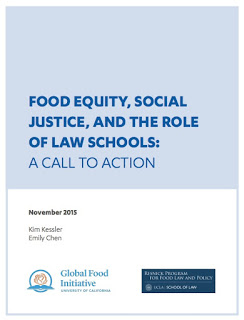| Online: | |
| Visits: | |
| Stories: |

| Story Views | |
| Now: | |
| Last Hour: | |
| Last 24 Hours: | |
| Total: | |
UCLA Resnick Program Issues New Report on Food Equity and Law Schools
The Resnick Program for Food Law & Policy at UCLA School of Law recently released an excellent report, Food Equity, Social Justice, and the Role of Law Schools: A Call to Action, researched and written by Kim Kessler and Emily Chen. The Report was written as part of the University of California’s Global Food Initiative. This system-wide initiative “challenges campuses to develop solutions for one of the most pressing issues of our time: the ‘quest to establish global food security and address related challenges of nutrition and sustainability.’” Michael T. Roberts serves as the Director of the Resnick Program.
The report articulates the need for law schools to “more visibly and holistically address this pressing societal challenge,” and it considers how law schools across the nation are currently addressing the “social, economic, and environmental injustice in our current food system.” It highlights the ongoing work within the California system. It then provides a compelling impetus for law schools to do more to confront the inequities within our food system and to integrate more food policy and food justice into the law school curriculum. We applaud the Resnick Center for putting out this “call to action.”
Several law schools receive special recognition in the Report with a case study describing the school’s work in this area. I was proud to have our work at the University of Arkansas as the first school acknowledged. The Report notes that “[i]n the field of food law and policy, the University of Arkansas School of Law has been foundational. For decades, the law school has been at the cutting edge of food and agricultural law and scholarship.” Both the Indigenous Food and Agriculture Initiative and the Food Recovery Project were referenced as examples of our outreach and national recognition. Our overall integrated and interdisciplinary approach is recognized, as we attempt to merge issues of sustainability, food security, food system resilience, and social justice throughout our curriculum.
Four of our classes “from [our] extensive curriculum” are highlighted as excellent examples of work in promoting food equity:
- Food Justice: Law & Policy (course created and taught by Nicole Civita);
- The Right to Food (course created and taught by Uche Ewelukwa);
- Business, Human Rights and Corporate Social Responsibility in the Food/Ag Sector (course created and taught by Uche Ewelukwa); and
- Legal Issues in Indigenous Food & Agriculture (course created and taught by Janie Hipp and Erin Shirl).
We are in excellent company. Beyond the opportunities presented within the University of California system, several other schools that received case study recognition:
- The Turner Environmental Law Clinic at Emory University School of Law “has made food law and policy one of its central focuses, with projects at all levels of government;”
- Harvard Law School is recognized as home to the “first Food Law and Policy Clinic in the Nation;”
- The University of Michigan Law School’s Community and Economic Development Clinic, has been “working to create the legal backbone of the ‘good food economy’” in Detroit;
- New York University School of Law’s International Human Rights Clinic of the Center for Human Right and Global Justice has undertaken “numerous research and advocacy projects that focused on food and agricultural policies and on the right to food;” and,
- An independent food justice project conducted through a Local Government class at Stanford Law School resulted in a new law in the state of California, Assembly Bill 551—the Urban Agriculture Incentive Zones Act.
The Report concludes that a lack of awareness of food equity issues and research constraints are two of the main challenges deterring law schools from additional work in this area. It then presents a series of thoughtful recommendations going forward.
Foundational to any recommendations for mobilizing law schools to address food equity issues is the importance of developing a shared understanding of: (1) the effects of our current food system on the health and economic mobility of disadvantaged communities throughout the food chain— from production to distribution (farm to fork), and (2) the resulting social and legal issues lawyers and law schools are in a unique position to address, and which can provide essential skills training for law students.
The report encourages schools to frame engagement in food equity issues as both an opportunity for students to engage in experiential learning and to recognize their law degree “as an empowering degree—how to use law in a rule of law society”. [citation omitted] It suggests that schools leverage existing classes, clinics, and experiential programs to capture the potential overlap with food equity and to innovate in the formation of partnerships. Practical suggestions, with best practices and implementation strategies are provided.
I hope that the Resnick Program’s Call to Action will be heard far and wide. There is rewarding and challenging work to be done in this critical area.
Source: http://aglaw.blogspot.com/2015/11/ucla-resnick-program-issues-new-report.html




